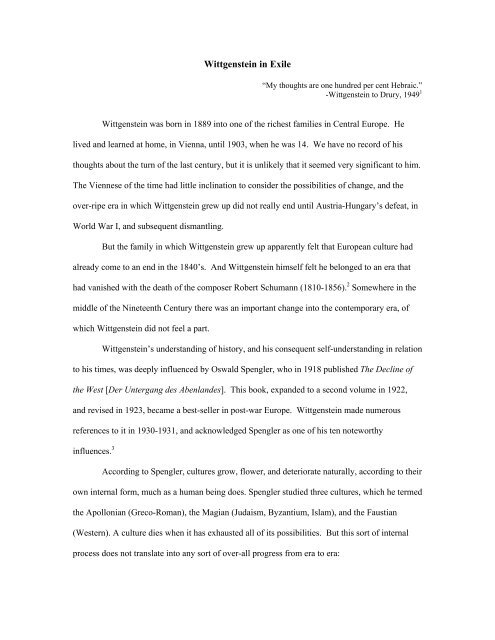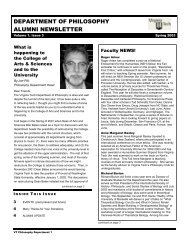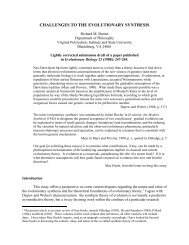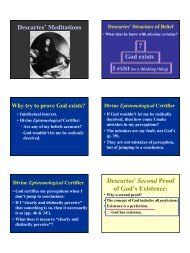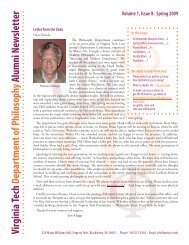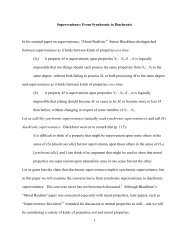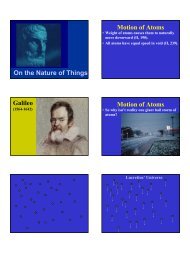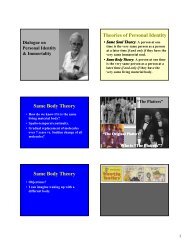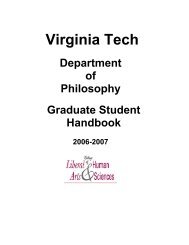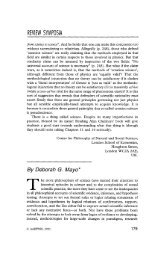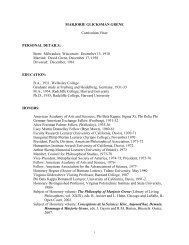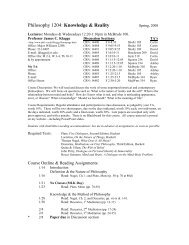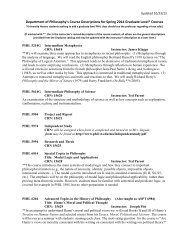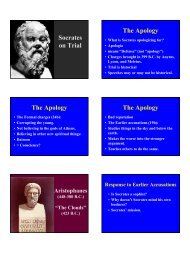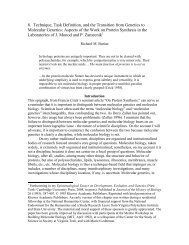Wittgenstein in Exile
Wittgenstein in Exile
Wittgenstein in Exile
You also want an ePaper? Increase the reach of your titles
YUMPU automatically turns print PDFs into web optimized ePapers that Google loves.
<strong>Wittgenste<strong>in</strong></strong> <strong>in</strong> <strong>Exile</strong><br />
“My thoughts are one hundred per cent Hebraic.”<br />
-<strong>Wittgenste<strong>in</strong></strong> to Drury, 1949 1<br />
<strong>Wittgenste<strong>in</strong></strong> was born <strong>in</strong> 1889 <strong>in</strong>to one of the richest families <strong>in</strong> Central Europe. He<br />
lived and learned at home, <strong>in</strong> Vienna, until 1903, when he was 14. We have no record of his<br />
thoughts about the turn of the last century, but it is unlikely that it seemed very significant to him.<br />
The Viennese of the time had little <strong>in</strong>cl<strong>in</strong>ation to consider the possibilities of change, and the<br />
over-ripe era <strong>in</strong> which <strong>Wittgenste<strong>in</strong></strong> grew up did not really end until Austria-Hungary’s defeat, <strong>in</strong><br />
World War I, and subsequent dismantl<strong>in</strong>g.<br />
But the family <strong>in</strong> which <strong>Wittgenste<strong>in</strong></strong> grew up apparently felt that European culture had<br />
already come to an end <strong>in</strong> the 1840’s. And <strong>Wittgenste<strong>in</strong></strong> himself felt he belonged to an era that<br />
had vanished with the death of the composer Robert Schumann (1810-1856). 2 Somewhere <strong>in</strong> the<br />
middle of the N<strong>in</strong>eteenth Century there was an important change <strong>in</strong>to the contemporary era, of<br />
which <strong>Wittgenste<strong>in</strong></strong> did not feel a part.<br />
<strong>Wittgenste<strong>in</strong></strong>’s understand<strong>in</strong>g of history, and his consequent self-understand<strong>in</strong>g <strong>in</strong> relation<br />
to his times, was deeply <strong>in</strong>fluenced by Oswald Spengler, who <strong>in</strong> 1918 published The Decl<strong>in</strong>e of<br />
the West [Der Untergang des Abenlandes]. This book, expanded to a second volume <strong>in</strong> 1922,<br />
and revised <strong>in</strong> 1923, became a best-seller <strong>in</strong> post-war Europe. <strong>Wittgenste<strong>in</strong></strong> made numerous<br />
references to it <strong>in</strong> 1930-1931, and acknowledged Spengler as one of his ten noteworthy<br />
<strong>in</strong>fluences. 3<br />
Accord<strong>in</strong>g to Spengler, cultures grow, flower, and deteriorate naturally, accord<strong>in</strong>g to their<br />
own <strong>in</strong>ternal form, much as a human be<strong>in</strong>g does. Spengler studied three cultures, which he termed<br />
the Apollonian (Greco-Roman), the Magian (Judaism, Byzantium, Islam), and the Faustian<br />
(Western). A culture dies when it has exhausted all of its possibilities. But this sort of <strong>in</strong>ternal<br />
process does not translate <strong>in</strong>to any sort of over-all progress from era to era:
…the 19 th and 20 th centuries, hitherto looked on as the highest po<strong>in</strong>t of an ascend<strong>in</strong>g straight l<strong>in</strong>e<br />
of world-history, are <strong>in</strong> reality a stage of life which may be observed <strong>in</strong> every Culture that has<br />
ripened to its limit….The future of the West is not a limitless tend<strong>in</strong>g upwards and onwards for all<br />
time towards our present ideals, but a s<strong>in</strong>gle phenomenon of history, strictly limited as to form and<br />
duration, which covers a few centuries… 4<br />
Our own Western era is supposed to have begun around 1000 with the soar<strong>in</strong>g vaults and<br />
spires of Romanesque and Gothic cathedrals, reached maturity <strong>in</strong> the Baroque period of Bach,<br />
begun to decl<strong>in</strong>e with the Rococo ref<strong>in</strong>ements and dar<strong>in</strong>g philosophical speculation of the<br />
Eighteenth and N<strong>in</strong>eteenth Centuries, and plunged <strong>in</strong>to deterioration <strong>in</strong> the N<strong>in</strong>eteenth and<br />
Twentieth Centuries. The maturity of an era, which Spengler called “culture” [Kultur], was<br />
equated with organism and religion. The end of an era, which Spengler called “civilization”<br />
[Zivilisation], was equated with mechanism and irreligion. Spengler writes:<br />
For every Culture has its own Civilization….The Civilization is the <strong>in</strong>evitable dest<strong>in</strong>y of the<br />
Culture….Civilizations are the most external and artificial states of which a species of developed<br />
humanity is capable. They are a conclusion, the th<strong>in</strong>g-become succeed<strong>in</strong>g the th<strong>in</strong>g-becom<strong>in</strong>g,<br />
death follow<strong>in</strong>g life, rigidity follow<strong>in</strong>g expansion….The transition from Culture to Civilization<br />
was accomplished for the Classical world <strong>in</strong> the fourth, for the Western <strong>in</strong> the n<strong>in</strong>eteenth century. 5<br />
This period of deterioration, both <strong>in</strong> the Roman Empire and <strong>in</strong> the modern West, Spengler saw as<br />
characterized by eclectic art, desiccated thought, politics as a façade for the power of money,<br />
mobs of people liv<strong>in</strong>g <strong>in</strong> large cities, and unend<strong>in</strong>g warfare.<br />
This contrast between culture and civilization was fundamental to <strong>Wittgenste<strong>in</strong></strong>’s<br />
understand<strong>in</strong>g of his own times. <strong>Wittgenste<strong>in</strong></strong> articulated this contrast most clearly <strong>in</strong> a draft he<br />
wrote for a foreword to a manuscript on which he was work<strong>in</strong>g <strong>in</strong> 1930:<br />
This book is written for those who are <strong>in</strong> sympathy with the spirit <strong>in</strong> which it is written. This is<br />
not, I believe, the spirit of the ma<strong>in</strong> current of European and American civilization. The spirit of<br />
this civilization makes itself manifest <strong>in</strong> the <strong>in</strong>dustry, architecture and music of our time, <strong>in</strong> its<br />
fascism and socialism, and it is alien and uncongenial to the author. This is not a value judgement.<br />
2
It is not, it is true, as though he accepted what nowadays passes for architecture as architecture or<br />
did not approach what is called modern music with the greatest suspicion (though without<br />
understand<strong>in</strong>g its language), but still, the disappearance of the arts does not justify judg<strong>in</strong>g<br />
disparag<strong>in</strong>gly the human be<strong>in</strong>gs who make up this civilization….<br />
I realize then that the disappearance of a culture does not signify the disappearance of<br />
human value, but simply of certa<strong>in</strong> means of express<strong>in</strong>g this value, yet the fact rema<strong>in</strong>s that I have<br />
no sympathy for the current of European civilization and do not understand its goals, if it has any. 6<br />
Clearly <strong>Wittgenste<strong>in</strong></strong> saw the era up through Schumann as the flower<strong>in</strong>g of Western culture, and<br />
the time s<strong>in</strong>ce, his and our own time, as deteriorat<strong>in</strong>g Western civilization. This accounts for the<br />
numerous disparag<strong>in</strong>g remarks <strong>Wittgenste<strong>in</strong></strong> made about modern arts. 7<br />
Indeed, the orig<strong>in</strong>al title<br />
of this symposium, “<strong>Wittgenste<strong>in</strong></strong> and Culture,” is mislead<strong>in</strong>g, s<strong>in</strong>ce <strong>Wittgenste<strong>in</strong></strong> did not believe<br />
that we or he had a culture. Spengler writes:<br />
The present is a civilized, emphatically not a cultured time, and ipso facto a great number of lifecapacities<br />
fall out as impossible….We are a civilized, not Gothic or Rococo, people; we have to<br />
reckon with the hard cold facts of a late life, to which the parallel is to be found not <strong>in</strong> Pericles’<br />
Athens but <strong>in</strong> Caesar’s Rome. Of great pa<strong>in</strong>t<strong>in</strong>g or great music there can no longer be, for<br />
Western people, any question. Their architectural possibilities have been exhausted these hundred<br />
years. Only extensive possibilities are left to them. 8<br />
S<strong>in</strong>ce <strong>Wittgenste<strong>in</strong></strong> identified with and felt grounded <strong>in</strong> this lost culture, he commonly<br />
expressed the feel<strong>in</strong>g that few—the remnant—would understand him. He concluded the early<br />
draft of his foreword (1930) with:<br />
So I am really writ<strong>in</strong>g for friends who are scattered throughout the corners of the globe.<br />
Reflect<strong>in</strong>g on this statement <strong>in</strong> 1931, <strong>Wittgenste<strong>in</strong></strong> writes:<br />
If I say that my book is meant for only a small circle of people (if it can be called a circle), I do not<br />
mean that I believe this circle to be the elite of mank<strong>in</strong>d; but it does comprise those to whom I turn<br />
(not because they are better or worse than others but) because they form my cultural milieu, my<br />
fellow citizens as it were, <strong>in</strong> contrast to the rest who are foreign to me. 9<br />
3
And <strong>in</strong> the Preface to his Philosophical Investigations, written <strong>in</strong> 1945, he says:<br />
It is not impossible that it should fall to the lot of this work, <strong>in</strong> its poverty, and <strong>in</strong> the darkness of<br />
this time, to br<strong>in</strong>g light <strong>in</strong>to one bra<strong>in</strong> or another—but, of course, it is not likely.<br />
In effect <strong>Wittgenste<strong>in</strong></strong> was an exile—not from his home-place so much as from his home-time, his<br />
cultural home. 10<br />
What is one to do as an exile? The Northern K<strong>in</strong>gdom of the Israelites accepted<br />
assimilation <strong>in</strong> Babylonia, as do most exiles, and disappeared from the history books. The<br />
Southern K<strong>in</strong>gdom of the Judaeans sought to reta<strong>in</strong> their identity <strong>in</strong> exile. Some of them “wept<br />
by the rivers of Babylon,” 11 while Isaiah prophesied “a voice cry<strong>in</strong>g <strong>in</strong> the wilderness.” 12<br />
This is<br />
a problem with which <strong>Wittgenste<strong>in</strong></strong> constantly struggled.<br />
Spengler was ready with advice:<br />
[This] is a time of decl<strong>in</strong>e. True. But we have not chosen this time. We cannot help it if we are<br />
born as men of the early w<strong>in</strong>ter of full Civilization, <strong>in</strong>stead of on the golden summit of a ripe<br />
Culture. Everyth<strong>in</strong>g depends on our see<strong>in</strong>g our own position, our dest<strong>in</strong>y, clearly, on our realiz<strong>in</strong>g<br />
that though we may lie to ourselves about it we cannot evade it. He who does not acknowledge<br />
this <strong>in</strong> his heart, ceases to be counted among the men of his generation, and rema<strong>in</strong>s either a<br />
simpleton, a charlatan, or a pedant. … One must beg<strong>in</strong> by ask<strong>in</strong>g oneself…what today is possible<br />
and what he must forbid himself. 13<br />
<strong>Wittgenste<strong>in</strong></strong> took this advice to heart <strong>in</strong> the draft foreword cited earlier:<br />
For <strong>in</strong> times like these, genu<strong>in</strong>e strong characters simply leave the arts aside and turn to other<br />
th<strong>in</strong>gs and somehow the worth of the <strong>in</strong>dividual man f<strong>in</strong>ds expression. Not, to be sure, <strong>in</strong> the way<br />
it would at a time of high culture. A culture is like a big organization which assigns each of its<br />
members a place where he can work <strong>in</strong> the spirit of the whole; and it is perfectly fair for his power<br />
to be measured by the contribution he succeeds <strong>in</strong> mak<strong>in</strong>g to the whole enterprise. In an age<br />
without culture on the other hand forces become fragmented and the power of an <strong>in</strong>dividual man is<br />
used up <strong>in</strong> overcom<strong>in</strong>g oppos<strong>in</strong>g forces and frictional resistances; it does not show <strong>in</strong> the distance<br />
he travels but perhaps only <strong>in</strong> the heat he generates <strong>in</strong> overcom<strong>in</strong>g friction. But energy is still<br />
4
energy and even if the spectacle which our age affords us is not the formation of a great cultural<br />
work, with the best men contribut<strong>in</strong>g to the same great end, so much as the unimpressive spectacle<br />
of a crowd whose best members work for purely private ends, still we must not forget that the<br />
spectacle is not what matters…<br />
And he goes on to write:<br />
It is all one to me whether or not the typical western scientist understands or appreciates my work,<br />
s<strong>in</strong>ce he will not <strong>in</strong> any case understand the spirit <strong>in</strong> which I write.<br />
Our civilization is characterized by the word ‘progress’. Progress <strong>in</strong> its form rather than<br />
mak<strong>in</strong>g progress be<strong>in</strong>g one of its features. Typically it constructs. It is occupied with build<strong>in</strong>g an<br />
ever more complicated structure. And even clarity is sought only as a means to this end, not as an<br />
end <strong>in</strong> itself.<br />
For me on the contrary clarity, perspicuity are valuable <strong>in</strong> themselves.<br />
I am not <strong>in</strong>terested <strong>in</strong> construct<strong>in</strong>g a build<strong>in</strong>g, so much as <strong>in</strong> hav<strong>in</strong>g a perspicuous view of<br />
the foundations of possible build<strong>in</strong>gs.<br />
So I am not aim<strong>in</strong>g at the same target as the scientists and my way of th<strong>in</strong>k<strong>in</strong>g is different<br />
from theirs. 14<br />
Much of <strong>Wittgenste<strong>in</strong></strong>’s later work was an attempt to change people’s th<strong>in</strong>k<strong>in</strong>g, especially what<br />
he took to be their tendency to an idolatry of science. This is explicit <strong>in</strong> the 1938 lectures on<br />
aesthetics, where <strong>Wittgenste<strong>in</strong></strong> claims to be mak<strong>in</strong>g propaganda for his style of th<strong>in</strong>k<strong>in</strong>g, and<br />
persuad<strong>in</strong>g his students aga<strong>in</strong>st the “idol worship” of science. 15<br />
Indeed, <strong>Wittgenste<strong>in</strong></strong> saw this as<br />
an <strong>in</strong>stance of his philosophical method: “All that philosophy can do is to destroy idols.” 16<br />
Though he also saw that such changes might be more a matter of chang<strong>in</strong>g the style of life than of<br />
chang<strong>in</strong>g just the style of thought. 17<br />
But what did <strong>Wittgenste<strong>in</strong></strong> th<strong>in</strong>k that he could accomplish, as the prophet <strong>in</strong> exile,<br />
preach<strong>in</strong>g aga<strong>in</strong>st the idols? <strong>Wittgenste<strong>in</strong></strong> had no illusions about the difficulty of his task:<br />
Put a man <strong>in</strong> the wrong atmosphere and noth<strong>in</strong>g will function as it should. He will seem unhealthy<br />
<strong>in</strong> every part. Put him back <strong>in</strong>to his proper element and everyth<strong>in</strong>g will blossom and look healthy.<br />
5
But if he is not <strong>in</strong> his right element, what then? Well, then he just has to make the best of<br />
appear<strong>in</strong>g before the world as a cripple. 18<br />
Could we return to the culture of a by-gone era? If anyth<strong>in</strong>g <strong>Wittgenste<strong>in</strong></strong> seemed to<br />
suppose that his thoughts might have value for a future culture. In 1949 he said to Drury:<br />
My th<strong>in</strong>k<strong>in</strong>g is not wanted <strong>in</strong> this present age, I have to swim so strongly aga<strong>in</strong>st the tide. Perhaps<br />
<strong>in</strong> a hundred years people will really want what I am writ<strong>in</strong>g. 19<br />
But perhaps some genu<strong>in</strong>e or <strong>in</strong>cipient culture existed <strong>in</strong> the present, only not <strong>in</strong> the<br />
West. It is with this thought that <strong>Wittgenste<strong>in</strong></strong> may have looked to Russia. Spengler clearly<br />
viewed Russia as the embryo of a new culture, and considered Dostoyevsky to be its prophet. 20<br />
It<br />
has never been clear exactly why <strong>Wittgenste<strong>in</strong></strong> was attracted to the idea of mov<strong>in</strong>g to Russia, 21 but<br />
it is by now hard to avoid the thought that it was, for him, a possible return from exile. Just as<br />
Palest<strong>in</strong>e was the Zionist goal of Jews <strong>in</strong> Diaspora, Russia could have seemed to be the homeland<br />
for the exile <strong>Wittgenste<strong>in</strong></strong>. 22<br />
<strong>Wittgenste<strong>in</strong></strong> took Russian lessons beg<strong>in</strong>n<strong>in</strong>g <strong>in</strong> 1934, and visited Russia for some two<br />
weeks <strong>in</strong> September, 1935, <strong>in</strong> search of permanent work there. Though th<strong>in</strong>gs did not go well,<br />
and presumably <strong>Wittgenste<strong>in</strong></strong> did not f<strong>in</strong>d what he thought he might, he was still contemplat<strong>in</strong>g a<br />
move as late as 1937. 23<br />
Perhaps he had trouble believ<strong>in</strong>g that Dostoyevsky’s Russia—the Home-<br />
Culture and promised land--did not really exist for him. Indeed, the homeland is rarely what it<br />
seems from abroad. 24 In any case, <strong>Wittgenste<strong>in</strong></strong> lived out his years <strong>in</strong> exile. 25<br />
While <strong>Wittgenste<strong>in</strong></strong> admired much <strong>in</strong> the lost culture of the West, there were few aspects<br />
of his contemporary “culture” that <strong>in</strong>terested him: some movies, especially American musicals<br />
and westerns with happy end<strong>in</strong>gs, detective stories, m<strong>in</strong>imalist architecture, basically just<br />
amusements and the th<strong>in</strong>gs one needed to get by—wholly without pretension. Indeed,<br />
<strong>Wittgenste<strong>in</strong></strong> tolerated little but the light baggage of an exile, wait<strong>in</strong>g for someth<strong>in</strong>g—the return<br />
ticket home—that he never found.<br />
6
See<strong>in</strong>g <strong>Wittgenste<strong>in</strong></strong> as an <strong>Exile</strong><br />
<strong>Wittgenste<strong>in</strong></strong>’s extensive discussion of “see<strong>in</strong>g as” <strong>in</strong> Section XI of Part II of the<br />
Philosophical Investigations seems pert<strong>in</strong>ent to our discussion. In particular, we have been<br />
“notic<strong>in</strong>g an aspect” (p. 193/p. 165 <strong>in</strong> 3 rd edition) of <strong>Wittgenste<strong>in</strong></strong>’s life. How we see<br />
<strong>Wittgenste<strong>in</strong></strong>’s life depends <strong>in</strong> part on what surround<strong>in</strong>gs we choose to emphasize. I have tried to<br />
arrange pieces of his life <strong>in</strong> such a way that it is natural to see similarities to the Hebrew concept<br />
of an exile. I have been helped <strong>in</strong> this by Spenglerian ideas that <strong>Wittgenste<strong>in</strong></strong> took seriously.<br />
<strong>Wittgenste<strong>in</strong></strong> exhibits many of the characteristics of an exile: He lives outside his own culture<br />
<strong>in</strong>voluntarily; he is alienated from his surround<strong>in</strong>gs; and he feels himself to be a voice cry<strong>in</strong>g <strong>in</strong><br />
the wilderness, preach<strong>in</strong>g to the faithful remnant, <strong>in</strong>veigh<strong>in</strong>g aga<strong>in</strong>st the idols. Not only does he<br />
exhibit these characteristics, but he uses the term “exile” (as well as “exiliert” and “Verbannung”<br />
<strong>in</strong> German) <strong>in</strong> describ<strong>in</strong>g himself.<br />
Once we see <strong>Wittgenste<strong>in</strong></strong> as an exile, I th<strong>in</strong>k this enables us to better understand some<br />
th<strong>in</strong>gs about his life and thought. It provides a motivation for his <strong>in</strong>terest <strong>in</strong> liv<strong>in</strong>g <strong>in</strong> Russia—a<br />
possible homeland for him. I th<strong>in</strong>k it also helps us to better understand his conception of the<br />
philosopher and the role of philosophy. And, I th<strong>in</strong>k it helps us to better understand his<br />
ambivalence about religion <strong>in</strong> his own life. To these latter issues I now turn.<br />
<strong>Exile</strong> and the Philosopher<br />
As far as I can tell, <strong>Wittgenste<strong>in</strong></strong>’s own th<strong>in</strong>k<strong>in</strong>g about philosophy and philosophers is not<br />
<strong>in</strong> any way <strong>in</strong>fluenced by Spengler’s ideas about philosophy. Spengler sees philosophy as<br />
embody<strong>in</strong>g the ideology of an age, and <strong>in</strong> particular, a mechanistic philosophy will be<br />
characteristic of a civilization of the sort <strong>in</strong> which we now live. 26<br />
But the notion of an exile, as<br />
generated by Spengler’s conceptual-historical scheme, is useful for th<strong>in</strong>k<strong>in</strong>g about <strong>Wittgenste<strong>in</strong></strong>’s<br />
conception of the philosopher.<br />
7
To what extent did <strong>Wittgenste<strong>in</strong></strong>’s role as an exile fit him to be a philosopher? His<br />
comments about philosophy and the nature of philosophy are quite various, but some of them<br />
resonate well with the metaphor of exile.<br />
<strong>Wittgenste<strong>in</strong></strong> wrote <strong>in</strong> 1931:<br />
(The philosopher is not a citizen of any community of ideas. That is what makes him a<br />
philosopher.) 27<br />
This makes it sound as though exile is an appropriate status for a philosopher, discomfort<strong>in</strong>g<br />
though it may be. Perhaps the separation from a community is what allows the philosopher to<br />
ga<strong>in</strong> the sort of synoptic overview of language necessary to see its ditches.<br />
In 1945 <strong>Wittgenste<strong>in</strong></strong> warned his friend Rush Rhees away from jo<strong>in</strong><strong>in</strong>g the Revolutionary<br />
Communist (Trotskyist) Party because of the conformity it would require:<br />
Whereas <strong>in</strong> do<strong>in</strong>g philosophy you have got to be ready constantly to change the direction <strong>in</strong> which<br />
you are mov<strong>in</strong>g….You must be able to give up those central notions which have seemed to be<br />
what you must keep if you are to th<strong>in</strong>k at all….And if you are th<strong>in</strong>k<strong>in</strong>g as a philosopher you<br />
cannot treat the ideas of communism differently from others. 28<br />
In 1931 <strong>Wittgenste<strong>in</strong></strong> had characterized the logician Frank Ramsey as a “bourgeois th<strong>in</strong>ker”:<br />
I.e., he thought with the aim of clear<strong>in</strong>g up the affairs of some particular community….The idea<br />
that this state might not be the only possible one <strong>in</strong> part disquieted him and <strong>in</strong> part bored him. He<br />
wanted to get down, as quickly as possible to reflect<strong>in</strong>g on the foundations—of this state. This<br />
was what he was good at and what really <strong>in</strong>terested him; whereas real philosophical reflection<br />
disturbed him until he put its result (if it had one) to one side and declared it trivial. 29<br />
Spell<strong>in</strong>g out the implications of this <strong>in</strong> 1944, <strong>Wittgenste<strong>in</strong></strong> shocked Rhees by declar<strong>in</strong>g that Georg<br />
Kreisel was the most able philosopher he had met who was also a mathematician. “More able<br />
than Ramsey?” Rhees asked. “Ramsey?!” replied <strong>Wittgenste<strong>in</strong></strong>. “Ramsey was a<br />
mathematician!” 30<br />
Presumably Ramsey was unable to ma<strong>in</strong>ta<strong>in</strong> a sufficient distance from<br />
mathematics to be a good philosopher.<br />
8
<strong>Wittgenste<strong>in</strong></strong> also used geographical imagery <strong>in</strong> his discussions of philosophy: “A<br />
philosophical problem has the form: ‘I don’t know my way about’.” 31<br />
He sometimes compared<br />
himself to a tour guide:<br />
I am try<strong>in</strong>g to conduct you on tours <strong>in</strong> a certa<strong>in</strong> country. I will try to show that the philosophical<br />
difficulties which arise <strong>in</strong> mathematics as elsewhere arise because we f<strong>in</strong>d ourselves <strong>in</strong> a strange<br />
town and do not know our way. So we must learn the topography by go<strong>in</strong>g from one place <strong>in</strong> the<br />
town to another, and from there to another, and so on. And one must do this so often that one<br />
knows one’s way, either immediately or pretty soon after look<strong>in</strong>g around a bit, wherever one may<br />
be set down….This is an extremely good simile….The difficulty of philosophy is to f<strong>in</strong>d one’s<br />
way about. 32<br />
This tour-guide metaphor fits well with the notion of exile: A philosopher has to be ready to be a<br />
guide for any part of the city. One who is too deeply immersed <strong>in</strong> a s<strong>in</strong>gle part of the city cannot<br />
play this role. Thus one cannot be a resident of any particular neighborhood, but must be able to<br />
rise above that, as Ramsey had not. Thus, be<strong>in</strong>g an exile is an asset so far as philosophy is<br />
concerned. 33<br />
From this perspective it is especially ironic that when <strong>Wittgenste<strong>in</strong></strong> sought employment <strong>in</strong><br />
Russia, dur<strong>in</strong>g his visit <strong>in</strong> 1935, whereas he had hoped for work as a doctor or as a laborer, the<br />
only th<strong>in</strong>g he was offered was work as a philosopher—as lecturer at the University of Moscow, or<br />
professor at Kazan University. 34<br />
It was presumably the very th<strong>in</strong>g <strong>in</strong> which success could be<br />
impeded by a flight from exile.<br />
Philosophy, Culture and Civilization<br />
In addition to comments on the role of the philosopher, <strong>Wittgenste<strong>in</strong></strong> also reflects on the<br />
nature of philosophical problems. In keep<strong>in</strong>g with the imagery of language as an ancient city, and<br />
the philosopher as a tour guide who can atta<strong>in</strong> and convey a synoptic view of the layout,<br />
<strong>Wittgenste<strong>in</strong></strong> suggests that philosophical problems are <strong>in</strong>herent <strong>in</strong> our language—they come with<br />
9
the territory. And by “our” language he not only means his language, but seem<strong>in</strong>gly all language,<br />
or at least the languages of the Western tradition. This, he expla<strong>in</strong>s, is why there is no “progress”<br />
<strong>in</strong> philosophy, even s<strong>in</strong>ce the time of the Greeks:<br />
It is because our language has rema<strong>in</strong>ed the same and keeps seduc<strong>in</strong>g us <strong>in</strong>to ask<strong>in</strong>g the same<br />
questions. As long as there cont<strong>in</strong>ues to be a verb ‘to be’ that looks as if it functions <strong>in</strong> the same<br />
way as ‘to eat’ and ‘to dr<strong>in</strong>k’, as long as we still have the adjectives ‘identical’, ‘true’, ‘false’,<br />
‘possible’, as long as we cont<strong>in</strong>ue to talk of a river of time, of an expanse of space, etc. etc., people<br />
will keep stumbl<strong>in</strong>g over the same puzzl<strong>in</strong>g difficulties and f<strong>in</strong>d themselves star<strong>in</strong>g at someth<strong>in</strong>g<br />
which no explanation seems capable of clear<strong>in</strong>g up. 35<br />
At other po<strong>in</strong>ts <strong>Wittgenste<strong>in</strong></strong> describes the problems as deriv<strong>in</strong>g from a mythology “laid down <strong>in</strong><br />
our language.” 36<br />
One should address them <strong>in</strong> a calm and bus<strong>in</strong>ess-like manner, but the process<br />
“doesn’t have an end”. 37<br />
To follow out the metaphor of the ancient city, the streets and ditches<br />
are where they are—no urban renewal is <strong>in</strong> prospect. The job of a tour-guide is never done,<br />
because there are always new people who need the tour; 38 or, perhaps the tour just never s<strong>in</strong>ks <strong>in</strong>:<br />
A philosopher says “Look at th<strong>in</strong>gs like this!”—but <strong>in</strong> the first place that doesn’t ensure that<br />
people will look at th<strong>in</strong>gs like that, and <strong>in</strong> the second place his admonition may come altogether<br />
too late; it’s possible, moreover, that such an admonition can achieve noth<strong>in</strong>g <strong>in</strong> any case and that<br />
the impetus for such a change <strong>in</strong> the ways th<strong>in</strong>gs are perceived has to orig<strong>in</strong>ate somewhere else<br />
entirely. 39<br />
<strong>Wittgenste<strong>in</strong></strong> sometimes talks as though there are th<strong>in</strong>gs that could happen that would<br />
f<strong>in</strong>ish the need for philosophy:<br />
I am by no means sure that I should prefer a cont<strong>in</strong>uation of my work by others to a change <strong>in</strong> the<br />
way people live which would make all these questions superfluous. 40<br />
And, <strong>in</strong>deed, this view seems possible from the larger perspective of <strong>Wittgenste<strong>in</strong></strong>’s thought,<br />
s<strong>in</strong>ce language is not a frozen and isolated entity. Language is a part of life, and <strong>in</strong>sofar as life<br />
changes, language and mean<strong>in</strong>g change too.<br />
10
From this perspective it seems at least possible that the evolution from culture to<br />
civilization, or the move from one tradition to another could well affect the role of, or need for,<br />
philosophy. Though there is noth<strong>in</strong>g <strong>in</strong> <strong>Wittgenste<strong>in</strong></strong>’s or Spengler’s comments about culture and<br />
civilization to suggest that one of these is less <strong>in</strong> need of philosophy, the variability of these sorts<br />
of epochs makes it quite unlikely that an a priori case could be made for the <strong>in</strong>evitable need for<br />
philosophy. 41<br />
Still, short of (what would seem to us to be) significant mental deterioration, it is<br />
hard to imag<strong>in</strong>e what changes “would make all these questions superfluous.” 42<br />
Religion and <strong>Exile</strong><br />
Spengler’s account of religion is not all that different from his account of philosophy.<br />
Both embody the ideology of an era. However, <strong>in</strong> the case of religion, <strong>Wittgenste<strong>in</strong></strong> is not so<br />
anxious to dissent.<br />
For <strong>Wittgenste<strong>in</strong></strong>, philosophy is an activity sui generis. One who is separated from the<br />
community is well-suited to engag<strong>in</strong>g <strong>in</strong> philosophy. Religion, however, is not, <strong>in</strong> this way,<br />
someth<strong>in</strong>g wholly separate. Or rather, religion has two aspects, the <strong>in</strong>ner aspect—one’s spiritual<br />
relationship to God—and the outer aspect—one’s participation <strong>in</strong> ceremony, obedience and<br />
lov<strong>in</strong>g behavior. Not surpris<strong>in</strong>gly, <strong>Wittgenste<strong>in</strong></strong>’s engagement with religion consisted almost<br />
entirely of the former. The latter was lost on, or more difficult for, an exile without a community.<br />
Thus, I believe, we get <strong>Wittgenste<strong>in</strong></strong>’s ambiguous attitude towards religion <strong>in</strong> his own life.<br />
Of course, <strong>Wittgenste<strong>in</strong></strong> was ambivalent about be<strong>in</strong>g a philosopher, too. But it was not<br />
ambivalence about whether he could be a philosopher, or be a good one, but about whether he<br />
should be a philosopher at all. His ambivalence concern<strong>in</strong>g religion was whether he could be<br />
religious. 43<br />
He certa<strong>in</strong>ly thought he should be religious, and he wanted to be religious. While he<br />
wished for the discovery that could allow him to stop do<strong>in</strong>g philosophy when he wanted to (PI<br />
133), he never sought the discovery that would allow him to stop try<strong>in</strong>g to be religious. It was<br />
someth<strong>in</strong>g that he wanted, and worked at obsessively <strong>in</strong> certa<strong>in</strong> respects, but was unable to accept<br />
11
<strong>in</strong> the forms <strong>in</strong> which it existed <strong>in</strong> the civilization <strong>in</strong> which he lived. Ironically, religion may have<br />
been the very th<strong>in</strong>g that could have stopped him th<strong>in</strong>k<strong>in</strong>g, and hence allowed him to stop do<strong>in</strong>g<br />
philosophy. As Russell wrote to Ottol<strong>in</strong>e, concern<strong>in</strong>g his meet<strong>in</strong>g with <strong>Wittgenste<strong>in</strong></strong> after World<br />
War I:<br />
He has penetrated deep <strong>in</strong>to mystical ways of thought and feel<strong>in</strong>g, but I th<strong>in</strong>k (though he wouldn’t<br />
agree) that what he likes best <strong>in</strong> mysticism is its power to make him stop th<strong>in</strong>k<strong>in</strong>g. 44<br />
Whether <strong>Wittgenste<strong>in</strong></strong> could have been (comfortably) religious <strong>in</strong> a culture to his lik<strong>in</strong>g,<br />
say <strong>in</strong> Dostoyevsky’s Russia, rema<strong>in</strong>s, <strong>in</strong> my m<strong>in</strong>d, an open question. Religion, then, was not the<br />
salvation of the exile, as it had been, for <strong>in</strong>stance, for the Hebrews, but <strong>in</strong> this case the frustration<br />
of the exile, <strong>Wittgenste<strong>in</strong></strong>. 45<br />
James C. Klagge<br />
Virg<strong>in</strong>ia Polytechnic Institute and State University<br />
1 M. O’C. Drury, “Conversations with <strong>Wittgenste<strong>in</strong></strong>,” <strong>in</strong> Recollections of <strong>Wittgenste<strong>in</strong></strong>, ed. R. Rhees, New<br />
York: Oxford University Press, revised edition, 1984, p. 161.<br />
2 See Brian McGu<strong>in</strong>ness, <strong>Wittgenste<strong>in</strong></strong>: A Life, Young Ludwig (1889-1921), Berkeley and Los Angeles:<br />
University of California Press, 1988, pp. 3 and 8; and also Ludwig <strong>Wittgenste<strong>in</strong></strong>, Culture and Value,<br />
Chicago: University of Chicago Press, 1980, & Oxford: Blackwell, 1998 (with modified translations); p. 2<br />
(<strong>in</strong> 1980 edition)/p. 4 (<strong>in</strong> 1998 edition). The 1994 German edition of Vermischte Bemerkungen has yet<br />
different pag<strong>in</strong>ation!<br />
3 Accord<strong>in</strong>g to Drury, <strong>in</strong> 1930, “<strong>Wittgenste<strong>in</strong></strong> advised me to read Spengler’s The Decl<strong>in</strong>e of the West. It<br />
was a book, he said, that might teach me someth<strong>in</strong>g about the age we were now liv<strong>in</strong>g <strong>in</strong>. It might be an<br />
antidote to my ‘<strong>in</strong>curable romanticism’” (p. 113). In 1931 <strong>Wittgenste<strong>in</strong></strong> listed Spengler as an important<br />
<strong>in</strong>fluence (C&V p. 19/16). <strong>Wittgenste<strong>in</strong></strong> very likely read Spengler while he was liv<strong>in</strong>g <strong>in</strong> Austria <strong>in</strong> the<br />
1920’s, before he returned to Cambridge <strong>in</strong> 1929. While <strong>Wittgenste<strong>in</strong></strong> was clearly <strong>in</strong>terested <strong>in</strong> the outl<strong>in</strong>e<br />
of Spengler’s views, he warned Drury: “I don’t trust Spengler about details. He is too often <strong>in</strong>accurate. I<br />
once wrote that if Spengler had had the courage to write a very short book, it could have been a great one”<br />
(p. 113). <strong>Wittgenste<strong>in</strong></strong>’s on-go<strong>in</strong>g <strong>in</strong>terest <strong>in</strong> Spengler <strong>in</strong>to 1950 is confirmed by von Wright’s editorial<br />
comments <strong>in</strong> “Letters from Ludwig <strong>Wittgenste<strong>in</strong></strong> to Georg Henrick von Wright,” Philosophical Occasions:<br />
1912-1951, ed. Klagge & Nordmann, Indianapolis: Hackett Publish<strong>in</strong>g Company, 1993, p. 478. Cf. also<br />
<strong>Wittgenste<strong>in</strong></strong>’s comments on Spengler <strong>in</strong> “Movements of Thought: Diaries, 1930-1932, 1936-1937,” Public<br />
and Private Occasions, ed. Klagge & Nordmann, Lanham: Rowman & Littlefield, 2003, pp. 25-7, 37, and<br />
219.<br />
For other discussions of Spengler’s <strong>in</strong>fluence on <strong>Wittgenste<strong>in</strong></strong>, see J. Peterman, Philosophy as<br />
Therapy, Buffalo: SUNY Press, 1992, Chapter 4; and Rudolf Haller, “Was <strong>Wittgenste<strong>in</strong></strong> Influenced by<br />
Spengler?” <strong>in</strong> Questions on <strong>Wittgenste<strong>in</strong></strong>, Omaha: University of Nebraska Press, 1988.<br />
4 Spengler, Decl<strong>in</strong>e of the West, New York: Alfred Knopf, vol. 1, 1926, p. 39 (pp. 29-30 <strong>in</strong> the 1991 Oxford<br />
University Press abridged edition).<br />
5 Spengler, pp. 31-32 (pp. 24-25).<br />
6 C&V p. 6/8-9. When <strong>Wittgenste<strong>in</strong></strong> reached the f<strong>in</strong>al draft, this foreword to the Philosophical Remarks<br />
was significantly shortened and focused:<br />
This book is written for such men as are <strong>in</strong> sympathy with its spirit. This spirit is different from<br />
the one which <strong>in</strong>forms the vast stream of European and American civilization <strong>in</strong> which all of us<br />
12
stand. That spirit expresses itself <strong>in</strong> an onwards movement, <strong>in</strong> build<strong>in</strong>g ever larger and more<br />
complicated structures; the other <strong>in</strong> striv<strong>in</strong>g after clarity and perspicuity <strong>in</strong> no matter what<br />
structure. The first tries to grasp the world by way of its periphery—<strong>in</strong> its variety; the second at<br />
its centre—<strong>in</strong> its essence. And so the first adds one construction to another, mov<strong>in</strong>g on and up, as<br />
it were, from one stage to the next, while the other rema<strong>in</strong>s where it is and what it tries to grasp is<br />
always the same.<br />
A student recalls <strong>Wittgenste<strong>in</strong></strong>, <strong>in</strong> a 1934 lecture, ejaculat<strong>in</strong>g: “Civilisation, or whatever you call the bloody<br />
th<strong>in</strong>g!” (Theodore Redpath, Ludwig <strong>Wittgenste<strong>in</strong></strong>: A Student’s Memoir, London: Duckworth, 1990, p. 36).<br />
7 Drury recalls <strong>Wittgenste<strong>in</strong></strong> pronounc<strong>in</strong>g, <strong>in</strong> 1930: “Music came to a full stop with Brahms; and even <strong>in</strong><br />
Brahms I can beg<strong>in</strong> to hear the sound of mach<strong>in</strong>ery” (p. 112). See also his thoughts on the problems with<br />
modern music <strong>in</strong> “Movements of Thought,” PPO, pp. 67-9.<br />
In the discussion of my paper at the conference, <strong>in</strong> response to comments by Timothy Tess<strong>in</strong>, I<br />
agreed that the phrase “accounts for” is wrong, and I would now change this to “is closely connected with”.<br />
It is not that Spengler’s theory caused <strong>Wittgenste<strong>in</strong></strong> to dislike modern art, but rather, <strong>Wittgenste<strong>in</strong></strong>’s dislike<br />
of modern art and his feel<strong>in</strong>g that he was liv<strong>in</strong>g <strong>in</strong> a civilization rather than a culture are two sides of the<br />
same co<strong>in</strong>.<br />
8 Spengler, p. 40 (most of this is <strong>in</strong> the abridged edition, p. 31).<br />
In light of this dist<strong>in</strong>ction between “culture” and “civilization,” “Culture and Value” turns out to<br />
be an extremely mislead<strong>in</strong>g title for the miscellaneous collection of remarks published orig<strong>in</strong>ally <strong>in</strong> German<br />
under the title Vermischte Bemerkungen [Miscellaneous Remarks].<br />
9 C&V p. 10/12-13. The notion of the “remnant” is prom<strong>in</strong>ent <strong>in</strong> Isaiah 10: 20-23, 11: 11-16, and 37: 31-<br />
32.<br />
The difficulties that <strong>Wittgenste<strong>in</strong></strong> encountered <strong>in</strong> writ<strong>in</strong>g from with<strong>in</strong> a time of civilization for an<br />
audience of a culture are explored <strong>in</strong> my paper “The Puzzle of Goethe’s Influence on <strong>Wittgenste<strong>in</strong></strong>,” <strong>in</strong><br />
Goethe and <strong>Wittgenste<strong>in</strong></strong>: See<strong>in</strong>g the World’s Unity <strong>in</strong> Its Variety, ed. F. Breithaupt, et al., Frankfurt: Peter<br />
Lang, 2003.<br />
10 “<strong>Exile</strong>” is a term that <strong>Wittgenste<strong>in</strong></strong> used to describe himself: Upon contemplat<strong>in</strong>g a move to Norway <strong>in</strong><br />
1913 to cont<strong>in</strong>ue his research, <strong>Wittgenste<strong>in</strong></strong> was cited by his friend David P<strong>in</strong>sent as follows: “he swears he<br />
can never do his best except <strong>in</strong> exile” (October 1 st , 1913 diary entry, <strong>in</strong> A Portrait of <strong>Wittgenste<strong>in</strong></strong> as a<br />
Young Man, ed. G.H. von Wright, Oxford: Blackwell, 1990, p. 85, and cf. p. 89). In his coded wartime<br />
notebook <strong>Wittgenste<strong>in</strong></strong> wrote: “This k<strong>in</strong>d, friendly letter [from P<strong>in</strong>sent] opens my eyes to the fact that I am<br />
liv<strong>in</strong>g <strong>in</strong> exile [Verbannung] here. It may be a heal<strong>in</strong>g exile, but I now feel it as an exile all the same”<br />
(Geheime Tagebücher: 1914-1916, ed. W. Baum, Vienna: Turia & Kant, 1991, 26.7.16, p. 74). And also<br />
his comment <strong>in</strong> his diary: “In my room I feel not alone but exiled [exiliert]” (“Movements of Thought,”<br />
PPO, 9.10.30, p. 55).<br />
For more on <strong>Wittgenste<strong>in</strong></strong>’s <strong>in</strong>ability to f<strong>in</strong>d comfort <strong>in</strong> any community, see my papers: “When<br />
Are Ideologies Irreconcilable? Case Studies <strong>in</strong> Diachronic Anthropology,” Philosophical Investigations,<br />
July, 1998; and “<strong>Wittgenste<strong>in</strong></strong>’s Community,” <strong>in</strong> eds., U. Meixner & P. Simons, Metaphysics <strong>in</strong> the Post-<br />
Metaphysical Age: Papers of the 22 nd International <strong>Wittgenste<strong>in</strong></strong> Symposium, Vol. VII (1), 1999. The<br />
former concerns his experiences dur<strong>in</strong>g World War I, the latter his experiences <strong>in</strong> Norway. Though the<br />
present paper is primarily about <strong>Wittgenste<strong>in</strong></strong>’s cultural isolation, it is an <strong>in</strong>terest<strong>in</strong>g and relevant fact that<br />
he often sought psychological and physical isolation. In addition to his time <strong>in</strong> Norway, there is also his<br />
time, after retirement, <strong>in</strong> western Ireland.<br />
11 Psalm 137:1. In 1948 <strong>Wittgenste<strong>in</strong></strong> wrote: “Someone lack<strong>in</strong>g a tradition who would like to have one is<br />
like a man unhappily <strong>in</strong> love” (C&V p. 76/86). <strong>Wittgenste<strong>in</strong></strong> was certa<strong>in</strong>ly a man unhappily <strong>in</strong> love...with<br />
Marguerite Resp<strong>in</strong>ger. His feel<strong>in</strong>gs are described extensively <strong>in</strong> the first year’s worth of entries <strong>in</strong><br />
“Movements of Thought,” PPO, pp. 9-81.<br />
12 Septuag<strong>in</strong>t version of Isaiah 40:3, as later quoted <strong>in</strong> Matthew 3:3 and John 1:23 and applied to John the<br />
Baptist.<br />
13 Spengler, p. 44 (some of this is on p. 34); and also p. 40 (some on p. 31). Discuss<strong>in</strong>g <strong>in</strong> 1946 an upcom<strong>in</strong>g<br />
Jo<strong>in</strong>t Session of the M<strong>in</strong>d Association and the Aristotelian Society meet<strong>in</strong>g, <strong>Wittgenste<strong>in</strong></strong> “railed<br />
aga<strong>in</strong>st professional philosophers, mourned the present state of philosophy <strong>in</strong> England and asked: ‘What<br />
can one man do alone?’ ” (Karl Britten, <strong>in</strong> Portraits of <strong>Wittgenste<strong>in</strong></strong>, vol. 2, ed. F. Flowers, Bristol:<br />
Thoemmes Press, 1999, p. 210). And cf. <strong>Wittgenste<strong>in</strong></strong>’s reference to the philosophical “charlatans” <strong>in</strong> his<br />
13
19.3.51 letter to Malcolm (Ludwig <strong>Wittgenste<strong>in</strong></strong>: A Memoir, New York: Oxford University Press, revised<br />
edition, 1984, p. 133).<br />
14 In these comments <strong>Wittgenste<strong>in</strong></strong> seems to be tak<strong>in</strong>g partly as his target Rudolf Carnap’s Preface to The<br />
Logical Structure of the World [Der Logistic Aufbau Der Welt], 1928. For a historical account of the<br />
concept of Kultur as it has functioned <strong>in</strong> German thought, see Raymond Geuss, “Kultur, Bildung, Geist,” <strong>in</strong><br />
Morality, Culture and History: Essays on German Philosophy, New York: Cambridge University Press,<br />
1999.<br />
A propos “the heat he generates <strong>in</strong> overcom<strong>in</strong>g friction”, <strong>in</strong> his diary (“Movements of Thought,”<br />
PPO, p. 73) <strong>Wittgenste<strong>in</strong></strong> compares himself to “the one who burnt down the library of Alexandria.”<br />
15 Lectures and Conversations on Aesthetics, Psychology and Religious Belief, ed. Cyril Barrett, Berkeley<br />
and Los Angeles: University of California Press, 1972, pp. 27-28. This concern pervaded <strong>Wittgenste<strong>in</strong></strong>’s<br />
later work, though he rarely said so. Based on a lecture entitled “<strong>Wittgenste<strong>in</strong></strong> as a Viennese” given by<br />
Stephen Toulm<strong>in</strong> <strong>in</strong> Memphis, Tennessee, on January 23, 1973, Peter Barker reports (“Uncle Ludwig’s<br />
Book About Science,” Philosophical Topics, 1981 Supplementary Volume, p. 71) the follow<strong>in</strong>g:<br />
When Allan Janik <strong>in</strong>terviewed <strong>Wittgenste<strong>in</strong></strong>’s family as part of his research for <strong>Wittgenste<strong>in</strong></strong>’s<br />
Vienna, he discovered that the family had their own names for their celebrated uncle’s most<br />
celebrated books. They called the Tractatus “Uncle Ludwig’s book on ethics,” and they called the<br />
Philosophical Investigations “Uncle Ludwig’s scientific work.”<br />
The ironic titles capture a truth <strong>in</strong> both cases that was not said but shown by their author.<br />
16 “Philosophy,” <strong>in</strong> Philosophical Occasions, p. 171 (and also p. 167=PI 118). And “I destroy, I destroy, I<br />
destroy--” <strong>in</strong> C&V, p. 21/19 (1931). Cf. the systematic destruction of idols commanded by Josiah and<br />
carried out <strong>in</strong> II K<strong>in</strong>gs 23: 1-30; and the most famous destruction of the golden calf by Moses <strong>in</strong> Exodus 32.<br />
17 C&V p. 61/70; and Remarks on the Foundations of Mathematics, Cambridge: MIT Press, rev. ed., 1978,<br />
p. 132.<br />
18 C&V p. 42/48-9 (1942). There seems almost to be a tradition <strong>in</strong> the Old Testament of prophets be<strong>in</strong>g<br />
crippled: Moses has a speech impediment (Exodus 4:10), Isaiah has his lip s<strong>in</strong>ged (Isaiah 6:7), and,<br />
metaphorically crippled, Hosea is made to marry and beget children with a whore (Hosea 1:2).<br />
<strong>Wittgenste<strong>in</strong></strong>’s student, Theodore Redpath, thought of him as a prophet even before he met him.<br />
See p. 16 of Redpath’s Ludwig <strong>Wittgenste<strong>in</strong></strong>: A Student’s Memoir.<br />
19 Drury, p. 160. And “Perhaps someday a culture will arise out of this civilization” (C&V p. 64/73, [1947]<br />
noticed by Tess<strong>in</strong>). See also “Movements of Thought,” PPO, p. 55. Cf. the preface to Nietzsche’s Will to<br />
Power: “This book is the property of the very few. Perhaps <strong>in</strong>deed not one of them is yet on earth.” In<br />
“The Puzzle of Goethe’s Influence on <strong>Wittgenste<strong>in</strong></strong>,” p. 25, I conjectured that 100 years was significant to<br />
<strong>Wittgenste<strong>in</strong></strong> because Spengler had supposed the West would be enter<strong>in</strong>g a new era of culture by then.<br />
20 Spengler, Decl<strong>in</strong>e of the West, New York: Alfred Knopf, vol. 2, 1928, pp. 192-6 (pp. 270-274). That<br />
Spengler thought of Russia as clearly outside of the Western tradition is made clear <strong>in</strong> a footnote on p. 16<br />
(12) of vol. I. Cf. also vol. II, p. 278.<br />
21 See the account <strong>in</strong> Ray Monk, <strong>Wittgenste<strong>in</strong></strong>: The Duty of Genius, New York: Free Press, 1990, pp. 348-<br />
354.<br />
22 Monk (pp. 247-8) sees <strong>Wittgenste<strong>in</strong></strong>’s attraction to Russia <strong>in</strong> light of John Maynard Keynes’ account, A<br />
Short View of Russia, Hogarth, 1925, which <strong>Wittgenste<strong>in</strong></strong> read <strong>in</strong> 1927 and appreciated. But the fact that<br />
<strong>Wittgenste<strong>in</strong></strong> and Engelmann already considered a “possible flight [Flucht, as <strong>in</strong> ‘escape’ or ‘exodus’] to<br />
Russia” <strong>in</strong> 1922 (Paul Engelmann, Letters from Ludwig <strong>Wittgenste<strong>in</strong></strong> with a Memoir, Oxford: Blackwell,<br />
1967, p. 53), suggests that his <strong>in</strong>terest was <strong>in</strong>stigated earlier by read<strong>in</strong>g Spengler.<br />
In his discussion with the Vienna Circle on 1 January, 1931, <strong>Wittgenste<strong>in</strong></strong> said: “What should be<br />
given to the Americans? Surely not our half-rotten culture. The Americans have no culture yet. From us,<br />
however, they have noth<strong>in</strong>g to learn….Russia. The passion is promis<strong>in</strong>g” (<strong>Wittgenste<strong>in</strong></strong> and the Vienna<br />
Circle, ed. B. McGu<strong>in</strong>ness, Oxford: Blackwell, 1979, p. 142).<br />
Engelmann himself went on, <strong>in</strong> 1925, to consider more seriously an escape to the real homeland.<br />
<strong>Wittgenste<strong>in</strong></strong> comments (p. 55):<br />
That you want to go to Palest<strong>in</strong>e is the one piece of good news that makes your letter cheer<strong>in</strong>g and<br />
hopeful for me. This may be the right th<strong>in</strong>g to do and may have a spiritual effect. I might want to<br />
jo<strong>in</strong> you. Would you take me with you?”<br />
But when Engelmann f<strong>in</strong>ally did emigrate to Tel Aviv <strong>in</strong> 1934, <strong>Wittgenste<strong>in</strong></strong> said no more about it (Monk,<br />
p. 229). By this po<strong>in</strong>t, he and Francis Sk<strong>in</strong>ner were already tak<strong>in</strong>g Russian lessons.<br />
14
An alternative possible explanation for <strong>Wittgenste<strong>in</strong></strong>’s <strong>in</strong>terest and trip to Russia has been raised <strong>in</strong><br />
a very speculative way by Kimberley Cornish, <strong>in</strong> his book The Jew of L<strong>in</strong>z (London: Century, 1998), where<br />
he proposes that <strong>Wittgenste<strong>in</strong></strong> was a Stal<strong>in</strong>ist sympathizer and recruiter. This would be <strong>in</strong>compatible with<br />
my account here.<br />
23 See <strong>Wittgenste<strong>in</strong></strong>’s diary entry of 4.4.37 (“Movements of Thought,” PPO, p. 237) while <strong>in</strong> Norway: “I<br />
sometimes consider whether I should leave here now already. For example: first to Vienna for a month,<br />
then to England for a month—or longer—then to Russia. And then return here?—Or to Ireland?”; and his<br />
last letter to Engelmann (21.6.37): “I am now <strong>in</strong> England for a short stay; perhaps I shall go to Russia. God<br />
knows what will become of me.” And von Hayek’s memoir of <strong>Wittgenste<strong>in</strong></strong>, “Remember<strong>in</strong>g My Cous<strong>in</strong>,<br />
Ludwig <strong>Wittgenste<strong>in</strong></strong>,” recounts that after World War II <strong>Wittgenste<strong>in</strong></strong> had visited Soviet-occupied Vienna:<br />
“He then engaged me <strong>in</strong> the most lively conversation, beg<strong>in</strong>n<strong>in</strong>g with his impressions of the Russians at<br />
Vienna, an experience which evidently had shaken him to his depth and destroyed certa<strong>in</strong> long-cherished<br />
illusions” (<strong>in</strong> Flowers, v. 1, p. 129).<br />
24 The tension between civilization and culture haunted <strong>Wittgenste<strong>in</strong></strong>’s homelife as well. His father, who<br />
represented progressive Western civilization, died <strong>in</strong> 1913. His mother, whose musical talents could have<br />
symbolized the lost Western culture, died <strong>in</strong> 1926. Yet dur<strong>in</strong>g the thirteen years of her widowhood<br />
<strong>Wittgenste<strong>in</strong></strong> was most pa<strong>in</strong>fully estranged from his family. See McGu<strong>in</strong>ness, pp. 28 and 22; and Monk, p.<br />
235.<br />
25 The Judaeans <strong>in</strong> exile, however, were allowed to return home by the Persians after their defeat of the<br />
Babylonians. Many, but not all, did. Spengler discusses this <strong>in</strong> vol. II, p. 207.<br />
26 I believe Spengler’s thoughts on the mechanistic philosophy of our times do <strong>in</strong>fluence <strong>Wittgenste<strong>in</strong></strong>’s<br />
th<strong>in</strong>k<strong>in</strong>g about the nature of causality. For more about this, see my papers: “<strong>Wittgenste<strong>in</strong></strong> on Non-<br />
Mediative Causality,” Journal of the History of Philosophy, October, 1999; and “The Puzzle of Goethe’s<br />
Influence on <strong>Wittgenste<strong>in</strong></strong>.”<br />
27 Zettel 455.<br />
28 R. Rhees, “Postscript,” <strong>in</strong> Recollections of <strong>Wittgenste<strong>in</strong></strong>, p. 208.<br />
29 C&V, p. 17/24.<br />
30 Monk, p. 498. <strong>Wittgenste<strong>in</strong></strong>’s puzzl<strong>in</strong>g attitude towards Ramsey is elaborated <strong>in</strong> his diary entry of<br />
27.4.30 <strong>in</strong> “Movements of Thought,” PPO, pp. 15-7.<br />
31 PI 123<br />
32 <strong>Wittgenste<strong>in</strong></strong>’s Lectures on the Foundations of Mathematics: Cambridge, 1939, ed. C. Diamond, Ithaca:<br />
Cornell University Press, 1976, p. 44. And similarly, the notes of lectures <strong>in</strong> Gask<strong>in</strong>g and Jackson,<br />
“<strong>Wittgenste<strong>in</strong></strong> as a Teacher,” <strong>in</strong> Ludwig <strong>Wittgenste<strong>in</strong></strong>: The Man and His Philosophy, ed. K. Fann, New<br />
York: Prometheus, 1967, pp. 49-55. Cf. also the comparison of language to the streets of an ancient city<br />
(PI 18); and the comparison of philosophical confusions to geographical misconceptions (PO p. 185).<br />
33 And if be<strong>in</strong>g a good philosopher requires be<strong>in</strong>g an exile, it is understandable that <strong>Wittgenste<strong>in</strong></strong><br />
encouraged his students to f<strong>in</strong>d work outside of philosophy.<br />
34 Monk, p. 351.<br />
35 C&V, p. 15/22 (1931), and PO pp. 185-7.<br />
36 PO p. 199.<br />
37 PO p. 195.<br />
38 Accord<strong>in</strong>g to Desmond Lee (p. 192 <strong>in</strong> Flowers, v. 2) <strong>Wittgenste<strong>in</strong></strong> “said once that one of the great<br />
drawbacks to a teacher’s life was that he was work<strong>in</strong>g always for a future he never saw, and that he was<br />
constantly hav<strong>in</strong>g to deal with a new generation of pupils; no endur<strong>in</strong>g visible result, only constantly<br />
chang<strong>in</strong>g generations.”<br />
39 C&V p. 61/70 (1947).<br />
40 From the same passage quoted above. And cf. Remarks on the Foundations of Mathematics, p. 132; and<br />
“Movements of Thought,” PPO, p. 169.<br />
41 Or for the supposed <strong>in</strong>evitable irrelevance of science to philosophy—an issue I address <strong>in</strong> “<strong>Wittgenste<strong>in</strong></strong><br />
and Neuroscience,” Synthese, March, 1989.<br />
42 In discussion after this paper was presented, Cora Diamond suggested that perhaps the illiterate peasantsoldier<br />
Platon, <strong>in</strong> Tolstoy’s War and Peace, would be immune to philosophical problems.<br />
43 Cf. <strong>Wittgenste<strong>in</strong></strong>’s feel<strong>in</strong>g, while a teacher <strong>in</strong> Lower Austria, that he had been “called” but had refused.<br />
See Monk’s <strong>in</strong>terest<strong>in</strong>g discussion of this and related material at pp. 199-200.<br />
15
44 Letter written December 20, 1919, and quoted by Monk, pp. 182-3. In a different context <strong>Wittgenste<strong>in</strong></strong><br />
wrote: “Only if I were to submerge myself <strong>in</strong> religion could all these doubts be stilled” (C&V, p. 48/54,<br />
1946).<br />
45 The open<strong>in</strong>g chapter of Norman Malcolm’s book <strong>Wittgenste<strong>in</strong></strong>: A Religious Po<strong>in</strong>t of View? (Ithaca:<br />
Cornell University Press, 1993) gives a helpful summary of <strong>Wittgenste<strong>in</strong></strong>’s actual engagement with religion<br />
(rather than his thoughts about religion). Further biographical details have come to light s<strong>in</strong>ce Malcolm<br />
wrote that chapter <strong>in</strong> 1990 (see Monk, pp. 573-5), but they do not essentially change the picture. Yet it is<br />
worth read<strong>in</strong>g the <strong>in</strong>tense account of <strong>Wittgenste<strong>in</strong></strong>’s spiritual struggles <strong>in</strong> the Lenten period of 1937 lead<strong>in</strong>g<br />
up to Easter and the reappearance of the sun <strong>in</strong> the Norway sky <strong>in</strong> “Movements of Thought,” PPO, pp. 175-<br />
237.<br />
16


